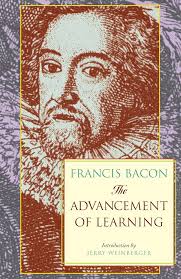The Advancement of Learning Page #28
The Advancement of Learning, published by Francis Bacon in 1605, is a foundational text in the history of science and philosophy. In this work, Bacon advocates for empirical research and the systematic organization of knowledge, laying the groundwork for the scientific method. The book critiques existing scholarly practices and proposes a new approach to learning based on observation and experimentation. It marks a significant shift towards modern scientific inquiry.
- Year:
- 1605
- 1,169 Views
Submitted by acronimous on August 11, 2024
Modified by acronimous on August 11, 2024
confused; but being examined, it seemeth to me rather a depredation of other sciences, advanced and exalted unto some height of terms, than anything solid or substantive of itself. Nevertheless I cannot be ignorant of the distinction which is current, that the same things are handled but in several respects. As for example, that logic considereth of many things as they are in notion, and this philosophy as they are in nature—the one in appearance, the other in existence; but I find this difference better made than pursued. For if they had considered quantity, similitude, diversity, and the rest of those extern characters of things, as philosophers, and in nature, their inquiries must of force have been of a far other kind than they are. For doth any of them, in handling quantity, speak of the force of union, how and how far it multiplieth virtue? Doth any give the reason why some things in nature are so common, and in so great mass, and others so rare, and in so small quantity? Doth any, in handling similitude and diversity, assign the cause why iron should not move to iron, which is more like, but move to the loadstone, which is less like? Why in all diversities of things there should be certain participles in nature which are almost ambiguous to which kind they should be referred? But there is a mere and deep silence touching the nature and operation of those common adjuncts of things, as in nature; and only a resuming and repeating of the force and use of them in speech or argument. Therefore, because in a writing of this nature I avoid all subtlety, my meaning touching this original or universal philosophy is thus, in a plain and gross description by negative: “That it be a receptacle for all such profitable observations and axioms as fall not within the compass of any of the special parts of philosophy or sciences, but are more common and of a higher stage.” (3) Now that there are many of that kind need not be doubted. For example: Is not the rule, Si inœqualibus æqualia addas, omnia erunt inæqualia, an axiom as well of justice as of the mathematics? and is there not a true coincidence between commutative and distributive justice, and arithmetical and geometrical proportion? Is not that other rule, Quæ in eodem tertio conveniunt, et inter se conveniunt, a rule taken from the mathematics, but so potent in logic as all syllogisms are built upon it? Is not the observation, Omnia mutantur, nil interit, a contemplation in philosophy thus, that the quantum of nature is eternal? in natural theology thus, that it requireth the same omnipotency to make somewhat nothing, which at the first made nothing somewhat? according to the Scripture, Didici quod omnia opera, quœ fecit Deus, perseverent in perpetuum; non possumus eis quicquam addere nec auferre. Is not the ground, which Machiavel wisely and largely discourseth concerning governments, that the way to establish and preserve them is to reduce them ad principia—a rule in religion and nature, as well as in civil administration? Was not the Persian magic a reduction or correspondence of the principles and architectures of nature to the rules and policy of governments? Is not the precept of a musician, to fall from a discord or harsh accord upon a concord or sweet accord, alike true in affection? Is not the trope of music, to avoid or slide from the close or cadence, common with the trope of rhetoric of deceiving expectation? Is not the delight of the quavering upon a stop in music the same with the playing of light upon the water? “Splendet tremulo sub lumine pontus.” Are not the organs of the senses of one kind with the organs of reflection, the eye with a glass, the ear with a cave or strait, determined and bounded? Neither are these only similitudes, as men of narrow observation may conceive them to be, but the same footsteps of nature, treading or printing upon several subjects or matters. This science therefore (as I understand it) I may justly report as deficient; for I see sometimes the profounder sort of wits, in handling some particular argument, will now and then draw a bucket of water out of this well for their present use; but the spring-head thereof seemeth to me not to have been visited, being of so excellent use both for the disclosing of nature and the abridgment of art. VI. (1) This science being therefore first placed as a common parent like unto Berecynthia, which had so much heavenly issue, omnes cœlicolas, omnes supera alta tenetes; we may return to the former distribution of the three philosophies—divine, natural, and human. And as concerning divine philosophy or natural theology, it is that knowledge or rudiment of knowledge concerning God which may be obtained by the contemplation of His creatures; which knowledge may be truly termed divine in respect of the object, and natural in respect of the light. The bounds of this knowledge are, that it sufficeth to convince atheism, but not to inform religion; and therefore there was never miracle wrought by God to convert an atheist, because the light of nature might have led him to confess a God; but miracles have been wrought to convert idolaters and the superstitious, because no light of nature extendeth to declare the will and true worship of God. For as all works do show forth the power and skill of the workman, and not his image, so it is of the works of God, which do show the omnipotency and wisdom of the Maker, but not His image. And therefore therein the heathen opinion differeth from the sacred truth: for they supposed the world to be the image of God, and man to be an extract or compendious image of the world; but the Scriptures never vouchsafe to attribute to the world that honour, as to be the image of God, but only the work of His hands; neither do they speak of any other image of God but man. Wherefore by the contemplation of nature to induce and enforce the acknowledgment of God, and to demonstrate His power, providence, and goodness, is an excellent argument, and hath been excellently handled by divers, but on the other side, out of the contemplation of nature, or ground of human knowledges, to induce any verity or persuasion concerning the points of faith, is in my judgment not safe; Da fidei quæ fidei sunt. For the heathen themselves conclude as much in that excellent and divine fable of the golden chain, “That men and gods were not able to draw Jupiter down to the earth; but, contrariwise, Jupiter was able to draw them up to heaven.” So as we ought not to attempt to draw down or submit the mysteries of God to our reason, but contrariwise to raise and advance our reason to the divine truth. So as in this part of knowledge, touching divine philosophy, I am so far from noting any deficience, as I rather note an excess; whereunto I have digressed because of the extreme prejudice which both religion and
Translation
Translate and read this book in other languages:
Select another language:
- - Select -
- 简体中文 (Chinese - Simplified)
- 繁體中文 (Chinese - Traditional)
- Español (Spanish)
- Esperanto (Esperanto)
- 日本語 (Japanese)
- Português (Portuguese)
- Deutsch (German)
- العربية (Arabic)
- Français (French)
- Русский (Russian)
- ಕನ್ನಡ (Kannada)
- 한국어 (Korean)
- עברית (Hebrew)
- Gaeilge (Irish)
- Українська (Ukrainian)
- اردو (Urdu)
- Magyar (Hungarian)
- मानक हिन्दी (Hindi)
- Indonesia (Indonesian)
- Italiano (Italian)
- தமிழ் (Tamil)
- Türkçe (Turkish)
- తెలుగు (Telugu)
- ภาษาไทย (Thai)
- Tiếng Việt (Vietnamese)
- Čeština (Czech)
- Polski (Polish)
- Bahasa Indonesia (Indonesian)
- Românește (Romanian)
- Nederlands (Dutch)
- Ελληνικά (Greek)
- Latinum (Latin)
- Svenska (Swedish)
- Dansk (Danish)
- Suomi (Finnish)
- فارسی (Persian)
- ייִדיש (Yiddish)
- հայերեն (Armenian)
- Norsk (Norwegian)
- English (English)
Citation
Use the citation below to add this book to your bibliography:
Style:MLAChicagoAPA
"The Advancement of Learning Books." Literature.com. STANDS4 LLC, 2025. Web. 10 Mar. 2025. <https://www.literature.com/book/the_advancement_of_learning_3165>.








Discuss this The Advancement of Learning book with the community:
Report Comment
We're doing our best to make sure our content is useful, accurate and safe.
If by any chance you spot an inappropriate comment while navigating through our website please use this form to let us know, and we'll take care of it shortly.
Attachment
You need to be logged in to favorite.
Log In